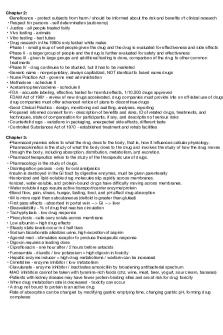Pharm Scenario 08 Suzanne Morris GRQ revised PDF

| Title | Pharm Scenario 08 Suzanne Morris GRQ revised |
|---|---|
| Course | Evaluation Strategies For Nurse Educators |
| Institution | University of Nevada, Las Vegas |
| Pages | 2 |
| File Size | 77.9 KB |
| File Type | |
| Total Downloads | 49 |
| Total Views | 147 |
Summary
vsim...
Description
Pharmacology Scenario 8: Suzanne Morris Guided Reflection Questions
Opening Questions How did the simulated experience of Suzanne Morris’s case make you feel? It was a challenge for me because it was my first interactive case study. I felt lost because I was not sure what to do that is why I had to do so many attempts. However, I believe it is a good way to learn, I am sure it will help me when I will work with real patients. Talk about what went well in the scenario. I did pretty good with health assessment and safety management. I had only some problems finding the right tools on the bar, but now I know what and where I can find. Reflecting on Suzanne Morris’s case, were there any actions you would do differently if you were to repeat this scenario? If so, how would your patient care change? I did not educate my patient about metronidazole and probiotics. I would deferentially do it on my next attempt. I think it is very important because a patient's disease is an adverse effect of antibiotics and it is very important to care about the normal flora.
Scenario Analysis Questions1 PCC/EBP What priority problem(s) did you identify for Suzanne Morris? I think that priority problems for Suzanne Morris were dehydration and pain. PCC/EBP
What information in Suzanne Morris’s medical history could have potentiated the C. difficile infection and why?
Suzanne Morris was treated with triple combination therapy of amoxicillin, clarithromycin, and pantoprazole for H. pylori. Antibiotics killed normal gut flora. EBP
What are the potential problems that could arise if the C. difficile was not treated immediately?
1 The Scenario Analysis Questions are correlated to the Quality and Safety Education for Nurses (QSEN) competencies: Patient-Centered Care (PCC), Teamwork and Collaboration (T&C), Evidence-Based Practice (EBP), Quality Improvement (QI), Safety (S), and Informatics (I). Find more information at: http://qsen.org/
From vSim for Nursing | Pharmacology. © Wolters Kluwer.
Severe C. difficile infection-causing dehydration, colon becoming inflamed and sometimes form patches of raw tissue that can bleed or produce pus. C. difficile infection may also cause severe intestinal inflammation, enlargement of the colon and sepsis. PCC/T &C/S
T&C
1. 2. 3. 4.
Discuss what should be taught to Suzanne Morris regarding her C. difficile infection.
needing to use the bathroom 10 or more times per day severe abdominal cramping and pain reduced appetite fatigue
What other interprofessional team members should be involved in Suzanne Morris’s care? Physician Nuirse Pharmasist Lab Technician
Concluding Questions Describe how you would apply the knowledge and skills that you obtained in Suzanne Morris’s case to an actual patient care situation. I see that is skipping an education part was my biggest mistake. As long as antibiotics are actual couse of Suzane Morris disease I have to be sure that patient has fule information about the adverse effects of medicines. I should deferentially educate the patient about probiotics because it is very important to restore normal gut flora.
From vSim for Nursing | Pharmacology. © Wolters Kluwer....
Similar Free PDFs

Suzanne chambers case- Solved
- 3 Pages

Bronfenbrenner & morris
- 37 Pages

16e GNB CH03 TB-final-revised 2017-08-18
- 149 Pages

Pharm final
- 7 Pages

Saffron Morris Edited - reading
- 24 Pages

Morris PLAN Updated
- 4 Pages

Pharm Final
- 13 Pages

Pharm Notes
- 3 Pages

Skyler GRQ - VSim
- 1 Pages
Popular Institutions
- Tinajero National High School - Annex
- Politeknik Caltex Riau
- Yokohama City University
- SGT University
- University of Al-Qadisiyah
- Divine Word College of Vigan
- Techniek College Rotterdam
- Universidade de Santiago
- Universiti Teknologi MARA Cawangan Johor Kampus Pasir Gudang
- Poltekkes Kemenkes Yogyakarta
- Baguio City National High School
- Colegio san marcos
- preparatoria uno
- Centro de Bachillerato Tecnológico Industrial y de Servicios No. 107
- Dalian Maritime University
- Quang Trung Secondary School
- Colegio Tecnológico en Informática
- Corporación Regional de Educación Superior
- Grupo CEDVA
- Dar Al Uloom University
- Centro de Estudios Preuniversitarios de la Universidad Nacional de Ingeniería
- 上智大学
- Aakash International School, Nuna Majara
- San Felipe Neri Catholic School
- Kang Chiao International School - New Taipei City
- Misamis Occidental National High School
- Institución Educativa Escuela Normal Juan Ladrilleros
- Kolehiyo ng Pantukan
- Batanes State College
- Instituto Continental
- Sekolah Menengah Kejuruan Kesehatan Kaltara (Tarakan)
- Colegio de La Inmaculada Concepcion - Cebu






